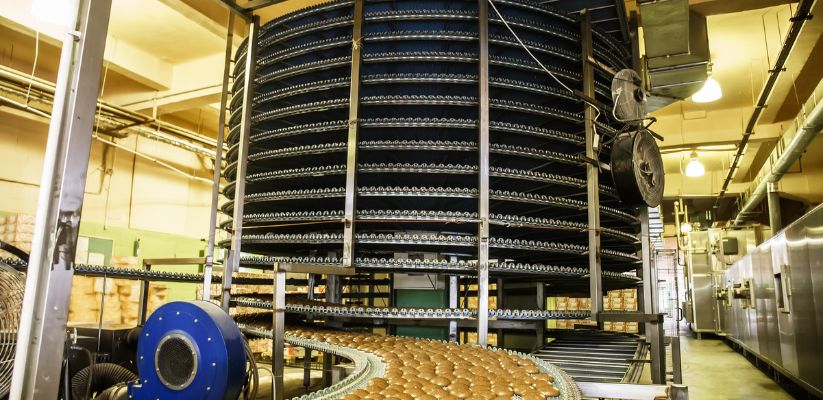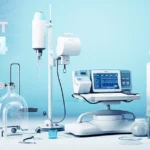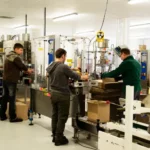Enterprise Resource Planning (ERP) is an extensive system that integrates all facets of a business, from accounting to production planning. ERP for food traceability is a specific application of the software that helps food companies track the movement of food items through the supply chain. It enables companies to quickly and easily trace the origin of a food item back to its supplier and to identify any potential issues with the product.
ERP for food industry traceability is becoming increasingly important as consumers demand greater transparency about their food since it offers great customer satisfaction. Moreover, in order to help companies comply with government regulations, ERP for food traceability can also help companies improve their bottom line by reducing waste and improving efficiency. Also, there is high competition for retail food dollars.
ERP software has revolutionized the food industry by providing a comprehensive, single system for managing all aspects of production, from ordering materials to shipping the finished product. The system offers several advantages for traceability, including:
– Tracking ingredients and materials from the supplier to the production line to the finished product
– Recording each step of the production process
– Tracking shipments from the factory to the distributor and finally to the retailer
– Recording and tracking customer orders
– Generating reports on product performance and trends
The systems provide an invaluable tool for tracing food items through production and ensuring that they meet safety and quality standards.
<<Also Read: How to better manage Inventory in the Food Production Industry? >>
How can ERP help to improve food and beverage services safety and quality?
Food quality and safety are important issues for organizations in the food industry sectors. ERP can help organizations improve food safety and quality by providing a centralized system for tracking food safety and quality data.
It can also help organizations track supplier and quality data. This can help organizations to ensure that they are sourcing food from suppliers that meet their food safety and quality standards.
How can ERP help to reduce food waste and costs?
Sage X3 ERP software can help businesses to reduce food waste and costs by streamlining processes and providing insights into where waste is happening. For example, a company can use the system to track food inventory levels and identify items nearing the end of their shelf life. This information can create a plan for ordering more inventory and reducing waste.
ERP in the food industry can also help businesses to track food costs and identify areas where they can save money. Companies can make changes that will positively impact their bottom line by understanding where food and beverage service is being wasted and where costs can be reduced.
Also Read: Importance of Data Analytics in the Food and Beverage Industry
What are the benefits of using ERP for Food Traceability?
ERP for food traceability can provide several benefits for food businesses. By tracking food consumed through the supply chain, companies can improve quality control, reduce waste, and ensure food safety. ERP systems can also help businesses to comply with food safety regulations.
One of the major advantages is that it helps to ensure food safety. With it, businesses in the food industry can quickly track food items from supplier to retailer and identify any potential food safety issues. This helps avoid outbreaks of foodborne illness and protects the business’s reputation.
Sage X3 also helps businesses to improve efficiency and profitability. Food traceability can help businesses to reduce waste and improve inventory management. It can also aid in identifying areas where costs can be reduced.
Overall, ERP solution for food industry provides several benefits for businesses that are dealing with food traceability. It helps to ensure food safety, improve efficiency and profitability, and protect the company’s reputation.
Also Read: What are the Primary Business Benefits of an ERP System?
How can ERP for Food & Beverage Traceability improve your business?
ERP for food traceability can help improve your business by tracking food items through the supply chain. This can help you ensure that food is quite safe to consume and reduce the risk of foodborne illnesses.
The system can also help you track food recalls, so you can quickly remove any potentially harmful food from store shelves.
What are the challenges of implementing ERP for Food Traceability?
There are many challenges that food companies face when trying to implement ERP systems for traceability.
Challenge 1 : The first challenge is that the software needs to handle the large volume of data generated by the food traceability process.
Challenge 2 : The second challenge is that the software needs to integrate with the other systems used in the food traceability process, such as inventory management and shipping systems.
Challenge 3 : The third challenge is that the software must interface with the existing data in the organization’s system in the food industry.
Challenge 4 : The fourth challenge is that the software needs to accomplish the particular needs of the food traceability process.
Challenge 5 : The fifth challenge is that the software needs to handle the complex rules and regulations associated with food traceability.
Challenge 6 : The sixth challenge is that the software needs to handle the various data formats used in the food traceability process.
Challenge 7 : The seventh challenge is that the software needs to provide real-time tracking of the food items throughout the supply chain.
Challenge 8 : The eighth challenge is that the system requires providing detailed reports on the food traceability process.
Challenge 9 : The ninth challenge is ensuring the system is up to date. The system needs to be able to track all of the movement to produce marketable food products through the supply chain, from farm to table. This can be difficult, especially when so many players are involved in the process.
Challenge 10 : The tenth challenge is getting all of the departments within the company to use the system in the same way. Each department may have its way of doing things, making it difficult to get everyone on board with the new system.
<<Also Read: How Product Recall plays a vital role in the F&B Industry?>>
How can you ensure a successful ERP for Food Traceability implementation in the modern food industry?
Food Traceability is tracking the product from the supplier to the consumer. It is essential in the food service industry to ensure the food is safe and meets the customer’s expectations. Sage X3 ERP for Food Traceability implementation is critical to ensuring the success of your food traceability program. There are various vital factors, also known as partially prepared components, to consider when planning your performance.
The first step is to fetch and analyze your current environment and identify your organization’s specific needs. Once you know what you need, you can look for an ERP that meets those needs. Selecting an ERP tailored to your two food industry sectors is essential and meets your organization’s specific needs. It should be able to handle the complex processes of food traceability and should offer single-point service.
Once you have selected the ERP, it is important to plan the implementation. The implementation should be planned carefully to ensure a successful rollout. There are several vital steps to consider when planning the implementation. The major step is to assess the current environment and identify your organization’s specific needs.
Once you know what you need, you can begin to look for an ERP that meets those needs. It is essential to select a system that is tailored to your industry and meets the specific needs of your organization. The ERP in food industry should be able to handle the complex processes of food traceability.
The implementation process should also be planned carefully to ensure a successful rollout. There are several vital steps to consider when planning the implementation. The primary step is to assess the current environment and identify your organization’s specific needs.
Once you know what you need, you can begin to look for an ERP that meets those needs. It is essential to select software that is tailored to your industry and meets the specific needs of your organization. It should be able to handle the complex processes of food traceability.
The implementation process should also be planned carefully to ensure a successful rollout.
Conclusion
In conclusion, Sage X3 can help the food industry ensure its products’ quality and safety by tracking the movement of products through the supply chain. This can help to reduce the risk of foodborne illnesses and ensure that products meet regulatory requirements.
Overall, ERP for food traceability can provide several benefits for food businesses. By tracking food items through the supply chain, companies can improve quality control, reduce waste, and ensure food safety. These systems can also help businesses to comply with food safety regulations.
Sage Software Solutions is a leading IT company with an array of advanced ERP Software solutions. Our proprietary products — Sage X3 and Sage 300 will help you cut your operational expenses, improve business productivity, increase operational efficiency, forge robust customer relationships, and strengthen association with vendors, suppliers, and distributors. So, if you are looking to reinforce your business fundamentals and emerge as an industry leader, then please schedule a call with one of our sales representatives.





